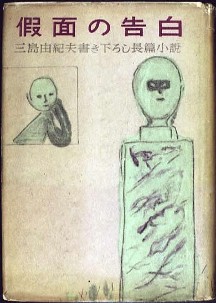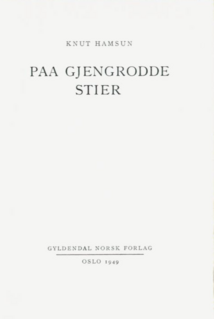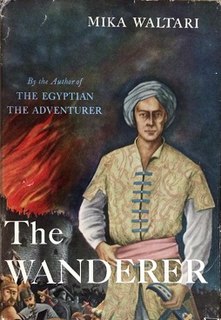 W
WAtheis is a 1949 Indonesian novel written by Achdiat Karta Mihardja and published by Balai Pustaka. The novel, using three narrative voices, details the rise and fall of Hasan, a young Muslim who is raised to be religious but winds up doubting his faith after dealings with his Marxist–Leninist childhood friend and an anarcho-nihilist writer.
 W
WThe Beautiful Summer is a novel by Italian author Cesare Pavese. It was first published in Italian as La bella estate in 1949. It was released in English by Peter Owen in 1955, and rereleased by Penguin European Writers in 2018.
 W
WThe Bottom of the Bottle is a novel by the Belgian writer Georges Simenon. The original French version Le Fond de la Bouteille, written in 1948 when Simenon was living in Arizona, appeared in 1949. The novel is among his romans durs, a term roughly translated as hard, or harrowing, novels; it was used by Simenon for what he regarded as his serious literary works.
 W
WCannon-Fodder is an unfinished novel by the French writer Louis-Ferdinand Céline. The largely autobiographical narrative is set before World War II, and roughly continues where Céline's 1936 novel Death on Credit ended. Much of the novel disappeared in 1944. Surviving fragments have been published from 1948 and onward, the main part in book form in 1949.
 W
WCelebrated Cases of Judge Dee is an 18th-century Chinese gong'an detective novel by an anonymous author, "Buti zhuanren". It is loosely based on the stories of Di Renjie, a county magistrate and statesman of the Tang court, who lived roughly 630–700. The novel contains cultural elements from later dynasties, rather than Tang Dynasty China, however.
 W
WConfessions of a Mask is Japanese author Yukio Mishima's second novel. First published in 1949, it launched him to national fame though he was only in his early twenties.
 W
WCré na Cille is an Irish language novel by Máirtín Ó Cadhain. It was first published in 1949. It is considered one of the greatest novels written in the Irish language.
 W
WIgbo Olodumare as is a mystery novel written by Daniel O. Fagunwa. Considered the second novel written in the Yoruba language, after its predecessor Ògbójú Ọdẹ nínú Igbó Irúnmọlẹ̀ and one of the first to be written in any African language, it was first published in 1949 and is Daniel O. Fagunwa's second novel. It is a prequel to his first book and details the adventures of Olowo-Aye, father of the protagonist in "Ogboju Ode ninu Igbo Irunmole."
 W
WIn a Dark Wood Wandering is a 1949 Dutch novel by Hella S. Haasse. It was translated from the Dutch into English in 1989 by Lewis C. Kaplan and revised and edited by Academy Chicago.
 W
WKarius and Bactus is a Norwegian children's novel written and illustrated by playwright Thorbjørn Egner. The book was first published in 1949 and produced as a 15-minute puppet animation film by film director Ivo Caprino in 1954. An English translation by Mike Sevig and Turi Olderheim was published in the United States in 1986.
 W
WDe kellner en de levenden is a novel from 1949 by Dutch author Simon Vestdijk containing an allegory of the Last Judgment.
 W
WKhirbet Khizeh is a historical fiction novel by Israeli writer S. Yizhar which was published in 1949, and deals with the expulsion of the fictional village of Khirbet Hiz'ah, practically representing a depiction of all Arab villages whose inhabitants were expelled during the Israeli war of independence in 1948, events which are known to Palestinians as the Nakba.
 W
WThe Kingdom of This World is a novel by Cuban author Alejo Carpentier, published in 1949 in his native Spanish and first translated into English in 1957. A work of historical fiction, it tells the story of Haiti before, during, and after the Haitian Revolution led by Toussaint Louverture, as seen by its central character, Ti Noel, who serves as the novel's connecting thread. Carpentier's work has been influenced by his multi-cultural experience and his passion for the arts, as well as by authors such as Miguel de Cervantes. The novel stems from the author's desire to retrace the roots and history of the New World, and is embedded with what Carpentier calls "lo real maravilloso" or "the marvelous real"—a concept he introduced to the world of literature.
 W
WThe Magic Chalk is a nonsensical children's novel written by Norwegian author Zinken Hopp in 1949. The novel has a slightly satirical tone and includes puzzles and poems.
 W
WMen of Maize is a 1949 novel by Guatemalan Nobel Prize in Literature winner Miguel Ángel Asturias. The novel is usually considered to be Asturias's masterpiece, yet remains one of the least understood novels produced by Asturias. The title Hombres de maíz refers to the Mayan Peoples' belief that their flesh was made of corn. Its title originates in the Popol Vuh, one of the sacred books of the Maya. The English translation is part of the UNESCO Collection of Representative Works.
 W
WThe Moon and the Bonfires is an English translation of the novel La Luna e i Falò, by the Italian poet and novelist Cesare Pavese. The book was written in Italian in 1949. It is considered Pavese's best novel.
 W
WA Nail Merchant at Nightfall is a 1949 novel by the Finnish writer Mika Waltari. It is a fictionalised and humorous account of when Waltari wrote his novel The Egyptian. It was published in English in 1954, translated by Alan Beesley.
 W
WNew Day is a 1949 book by Jamaican author V. S. Reid. It was Reid's first novel. New Day deals with the political history of Jamaica as told by a character named Campbell, who is a boy at the time of the Morant Bay Rebellion and an old man during its final chapters. It may have been the first novel to use Jamaican vernacular as its language of narration.
 W
WOn Overgrown Paths is the English title of the final novel by Norwegian author and nobel laureate Knut Hamsun. Hamsun's attempt to prove his soundness of mind after his sanity was called into question. Writing at the age of 90 it was his last literary work the short novel is part a fiction pamphlet, part diary, part old man's apologia and part protest at the court ruling in his 1948 trial, that determined he had "permanently impaired mental abilities"."St. John's Day, 1948 - Today, the Supreme Court has given its verdict and I end my writing."
 W
WTroubled Sleep is a 1949 novel by Jean-Paul Sartre. The book was originally translated as Iron in the Soul. It is the third part in the trilogy Les chemins de la liberté.
 W
WThe Wanderer or The Sultan's Renegade is a 1949 historical novel by Mika Waltari. It is a sequel to The Adventurer, which tells of the adventures of a young Finnish man, Mikael Karvajalka, in 16th-century Europe. The Wanderer tells the story of how Mikael converts from Christianity to Islam and rises to a high position in the court of Suleiman the Magnificent. Many historical events are recounted in the book, but Mikael's involvement in them is fictitious.